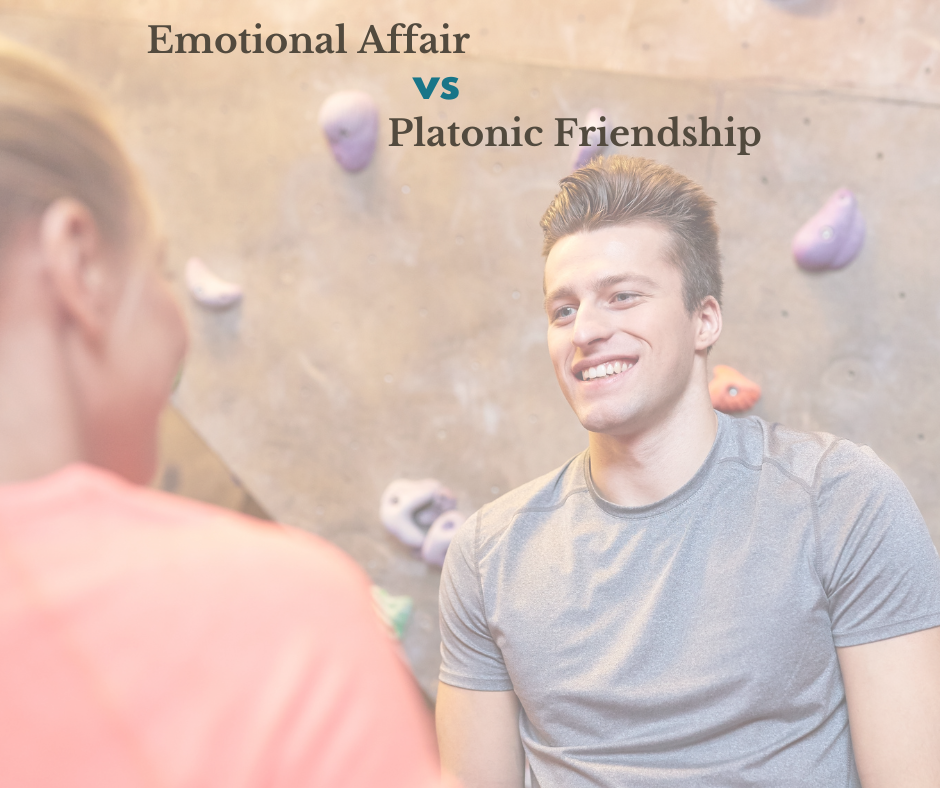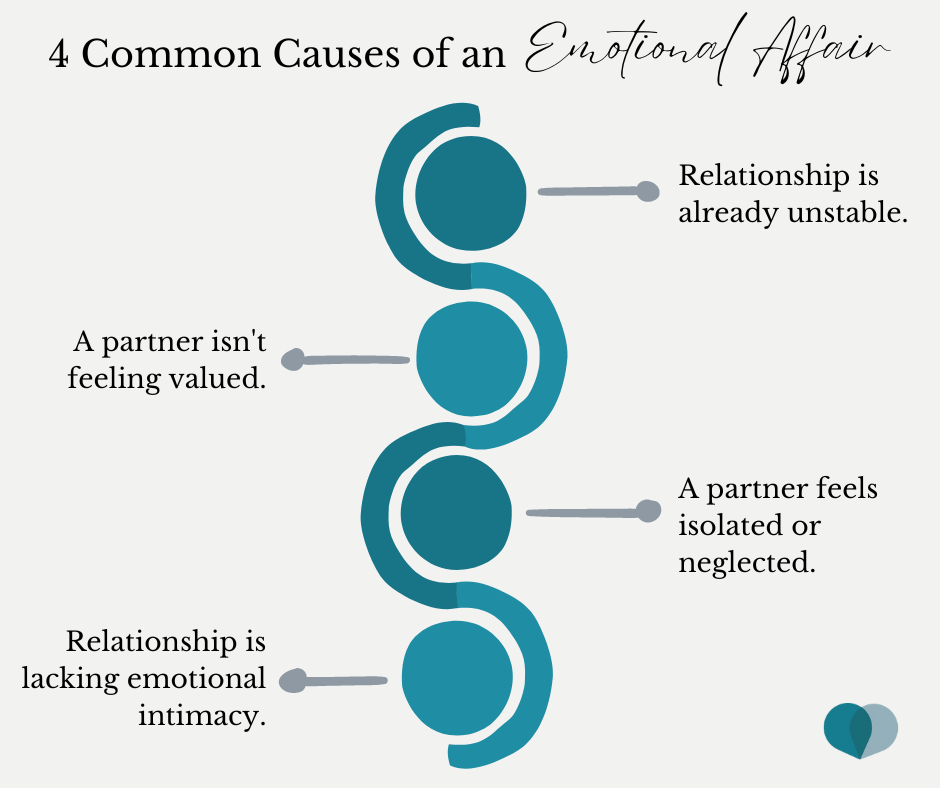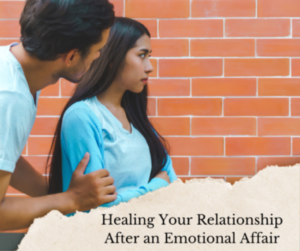When we talk about infidelity, most people associate the term with a hot, steamy, and romantic physical relationship. Rarely do people consider another type of infidelity: an emotional affair. It’s often dismissed as “friendly flirting” or texts between friends but platonic intimacy can sometimes be more damaging to a relationship than when a partner physically cheats.

What Makes a Relationship an Emotional Affair?
First, we need to define what an emotional affair is – and it typically varies between people. But an emotional affair happens when someone in a relationship becomes sentimentally or emotionally involved with someone else who isn’t their partner. It can start from a platonic friendship and evolve into something deeper with an emotional connection that resembles an intimate relationship most often found in marriage or long-term relationship.
An emotional affair is a lot like physical infidelity because it’s maintained in secret. When exposed, it creates a violation of trust often found when a partner physically cheats in the relationship. What sets emotional affairs apart is they can happen over phone conversations, text messages, online via chat, and in-person. They can also act as gateway affairs that lead to both physical and emotional cheating.
Emotional Affair Versus Platonic Friendship
According to Merriam-Webster, platonic love is “a close relationship between two persons in which sexual desire is nonexistent or has been suppressed or sublimated.” In short, it’s two friends that are close and care for each other but not close in a way that crosses lines and boundaries.
While emotional affairs may start due to a friendship, that isn’t always the case. It’s also not a reason to become alarmed. A platonic friendship can share some similarities with that of an emotional affair but it’s still very different.
Typically, two people with a close bond can be platonic friends and nothing more. They may feel love for one another but the love is platonic and will never be more than that. Lines get blurred and boundaries are crossed when the emotional investment in a friendship is kept secret or downplayed.

Levels of Emotional Affairs
As humans, we’re not great at forming real emotional connections in a short time span, and emotional connections aren’t formed in one day. They take time. As time goes on and a person moves into platonic intimacy, there are stages they often go through:
Friendship
Every emotional affair begins with a friendship. It may start as a simple, innocent bond where two people enjoy each other’s company, share common interests, or work together. At this stage, the relationship is still within the bounds of a platonic friendship. There’s no intent to harm the primary relationship, but the connection is the foundation for something more.
Infatuation
As the friendship deepens, feelings of infatuation may develop. This is when admiration and attraction begin to surface. The excitement of spending time with this person increases, and thoughts about them may start to take up more mental space. At this stage, the line between friendship and emotional infidelity can start to blur.
Secrecy
With the rise of infatuation, secrecy often follows. The person involved in the emotional cheating might begin to hide the extent of their relationship from their partner. They may downplay how often they communicate or meet with this other person. The secrecy adds an element of excitement and thrill, further deepening the emotional connection.
Dependency
The final stage is dependency, where the emotional affair becomes a primary source of emotional fulfillment. The person may turn to their emotional partner for support, comfort, and validation more than they do with their spouse or significant other. This level of dependency can be damaging to the primary relationship as it creates a rift between partners, leading to emotional distance and disconnect.

Common Causes of Emotional Affairs
Emotional infidelity is more common than you may realize and there are a few reasons why someone may choose to be in an emotional affair even when they know it’s hurtful to their partner. Unearthing why your relationship is vulnerable to an affair of any kind is important.
Here are some common reasons why people seek attention from others outside of their primary relationship:
- The marriage or partnership is already unstable and getting attention from another person is a quick way to push it overboard.
- The time and energy spent with another person is not seen as infidelity or cheating because it wasn’t physically intimate.
- The couple isn’t having sex or other forms of intimacy so the person having the affair seeks someone to fill that space.
- One person in the marriage frequently feels isolated or neglected and needs an emotional connection to feel whole.
- Someone isn’t feeling valued in the relationship and seeks validation elsewhere.
- An attraction to someone feels good and can be addictive.
- One partner has impulse control issues and isn’t easily emotionally regulated which makes it easier for them to become subject to and give in to temptation.
- A lack of communication leaves one partner feeling misunderstood or unsupported, driving them to seek emotional support from someone else.
- Boredom or routine in the relationship can lead one partner to look for excitement or novelty outside of the marriage, even if they still care for their spouse.
Take a look at where you are in your relationship and start to evaluate where you are as a couple. If it seems like you or your partner are distant, or things are a little rocky, it’s time to prioritize your relationship and work with a couples therapist to help you learn how to restore and keep your emotional connection.
Signs Your Partner Is Having an Emotional Affair
Recognizing the signs of emotional infidelity can be challenging, as they’re often subtle and easily mistaken for close friendships. However, there are some red flags that may indicate something more is going on:
- Increased Secrecy: Hiding phone, texts, or social media activity; vague about whereabouts.
- Frequent Mentions: Constantly bringing up or comparing you to a particular person.
- Emotional Distance: Less communication, reduced intimacy, or disinterest in your daily life.
- Prioritizing Time Together: Spending more time with the other person and less with you.
Working Through an Emotional Affair as a Couple
Let’s face it, an emotional affair is just as hurtful as physically cheating on your partner but that doesn’t mean you can’t work through it and rebuild the relationship. Your marriage can recover from an emotional affair but both partners need to be on board and work towards healing. Rebuilding trust after an affair isn’t easy and both partners will need to work to understand how the affair happened in order for them to work toward healing as a couple. Working with a therapist who specializes in infidelity will make it easier.
Healing Your Partnership After an Emotional Affair
Almost every couple in this situation believes that people fall into two categories:
- The partner who was emotionally cheating
- The partner hurt by the affair
However, we need to look at how each person contributed to the emotional affair, and that fact can be challenging when you weren’t the overt participant. It’s easier to blame the person who went outside the marriage but emotional affairs tend to happen due to the dynamic between partners. When you acknowledge that it takes two to tango, you can outline where improvements need to be made.
Sometimes a therapist can help you look at what happened in your partnership in a non-judgemental setting but if you’re not ready for that, try some self-introspection. Take stock of your partnership and how you each contributed to the situation you’re in.
If You Are The Person In The Relationship To Engage In The Emotional Affair, Therapy Can Help You
- End your emotional affair and cut ties with that person: Given the intense emotional connection shared, it’s crucial that your affair concludes and you cut off all communication.
- Be open and honest with your partner about the affair: Your partner needs transparency and not an abridged version of what happened.
- Don’t just say “I’m sorry”: Express genuine remorse which means digging deep and allowing your spouse or partner to see your emotional pain. Expressing an empathetic apology can help ease the isolation your partner is feeling.
- Acknowledge the impact on your partner: Understand and validate the emotional pain your partner is experiencing due to your actions.
- Take responsibility: Accept full responsibility for your actions without blaming external factors. Owning your mistakes is a critical step in rebuilding trust.
- Commit to rebuilding trust: Show your partner that you’re committed to doing the necessary work to restore trust.
- Be patient with your partner’s healing process: Recognize that your partner may need time to heal and regain trust. Be patient and supportive as they work through their emotions.

When To Seek Out A Couples Counselor To Help?
If you suspect that an emotional affair is occurring or if your relationship is suffering from the effects of one, it may be time to seek out a couples counselor. Therapy can provide a safe space for both partners to explore their feelings, communicate openly, and work on rebuilding trust.
Work Through An Emotional Affair
Infidelity of any kind can create strain and nearly kill communication between partners but communicating your wants and needs to your partner is vital when you want to heal your partnership after the affair. If you skipped the therapy-route to discover your role in the situation, now is the time to enlist the help of a therapist for affair counseling. They can help you both understand boundaries while helping you assess the expectations of your relationship.
If both of you want to move forward and heal from an emotional affair, make it less stressful by working with me in Texas. Reach out to and schedule a call to see how I can help you.




